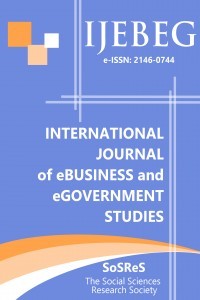REFERENDUMS AND E-VOTING IN TURKEY
REFERENDUMS AND E-VOTING IN TURKEY
referendum, e-voting, voter voter file, tourism,
___
- Akın M., 2006. “Elektronik Oy Verme Sistemlerinde Güvenlik: Deneyimler ve Türkiye
- İçin Öneriler”, İstanbul Üniversitesi İktisat Fakültesi Ekonometri ve İstatistik Dergisi, Sayı:3, 11-12. Çam, E. 1987. Siyaset Bilimine Giriş, Der Yayınları, Yayın No:34, İstanbul.
- Gözübüyük, Ş. 1999. Yönetim Hukuku, Turhan Kitabevi, 12. Baskı, Ankara.
- Gözübüyük, Ş. 2005. Açıklamalı Türk Anayasaları Yapılışları, Özellikleri ve Yapılan
- Değişiklikler, Beşinci Baskı, Ankara. Kapani, M. 2003. Politika Bilimine Giriş, Bilgi Yayınları, 15. Baskı, İstanbul.
- Öztekin, G. 2002. Yönetim Bilimi, Siyasal Kitabevi, Ankara.
- Ranney, A. 1996. Governing, An Introduction to Political Science, 7th Edition, Prentice Hall, USA.
- Shalom, S. R. 2003. Which Side Are You On? An Introduction to Politics, Longman, USA
- Soysal, M. 1993. 100 Soruda Anayasa Kavramı, İkinci Baskı, Ankara.
- Üste, B. 1999. Türkiye’de Seçim Sistemi Arayışları –Bir Alternatif Model, Dokuz
- Eylül Üniversitesi Yayınları, İzmir. Örmeci, O. http://ydemokrat.blogspot.com/2010/09/referandum-ve-turkiyede- referandum.html http://www.uzmanportal.com/referandum-nedir-referandum-nasil-yapilir.html/
- Başlangıç: 2009
- Yayıncı: Sosyal Bilimler Araştırmaları Derneği
ELECTRONIC PARTICIPATION IN THE POLICY MAKING PROCESS: A CASE STUDY
Kamil Demirhan, M. Kemal Öktem
Mustafa SAĞSAN, Şerife EYÜPOĞLU, Tülen SANER
Karim AL-YAFI, Habin LEE, Afshin MANSOURI
Muhajir Kachwamba, Iddi Makombe
REFERENDUMS AND E-VOTING IN TURKEY
Rabia Bahar ÜSTE, Berrin GÜZEL
TACIT KNOWLEDGE EXTRACTION FOR SOFTWARE REQUIREMENT SPECIFICATION
Serbülent ÜNSAL, Meryem AYAS, Tunc Durmuş MEDENİ
Burcu Bastabak, Tunc Durmus Medeni
Ahmet Ozturk, Koray Umit, Ihsan Tolga Medeni, Burak Ucuncu, Meryem Caylan, Firat Akba, Tunc Durmus Medeni
GLOBAL PRODUCTION NETWORKS and KNOWLEDGE TRANSFER MECHANISIMS
